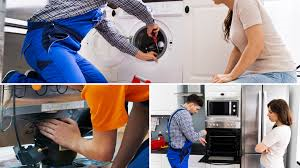
Maintaining and repairing your household appliances is essential for prolonging their lifespan, ensuring efficient operation, and preventing costly breakdowns. Regular maintenance can save you time, money, and the inconvenience of dealing with unexpected appliance failures. This comprehensive guide will walk you through the key aspects of appliance maintenance and repair, offering practical tips and insights to keep your appliances in top shape.
1. The Importance of Regular Maintenance
Extending Appliance Lifespan:
- Regular maintenance can significantly extend the life of your appliances. By keeping them clean and in good working order, you can prevent wear and tear that leads to premature breakdowns.
Improving Efficiency:
- Well-maintained appliances operate more efficiently, consuming less energy and water. This not only reduces your utility bills but also minimizes your environmental footprint.
Preventing Breakdowns:
- Routine maintenance helps identify potential issues before they become major problems. Addressing these issues early can prevent costly repairs and avoid the inconvenience of appliance failures.
2. General Maintenance Tips for Common Appliances
Refrigerator Maintenance:
- Clean the Coils: Dust and debris can accumulate on the condenser coils, causing the refrigerator to work harder. Clean the coils every six months to maintain efficiency.
- Check the Seals: Ensure the door seals are tight and free of cracks. Replace them if necessary to prevent cold air from escaping.
- Defrost Regularly: If your refrigerator doesn’t have an automatic defrost feature, manually defrost it regularly to prevent ice buildup.
Washing Machine Maintenance:
- Inspect Hoses: Check the hoses for any signs of wear or leaks. Replace them every five years to prevent water damage.
- Clean the Drum and Dispenser: Run an empty cycle with a washing machine cleaner or vinegar to remove detergent buildup and odors.
- Balance the Machine: Ensure the washing machine is level to prevent excessive vibrations and noise.
Dryer Maintenance:
- Clean the Lint Filter: After every use, clean the lint filter to improve airflow and prevent fire hazards.
- Inspect the Vent: Check the vent hose for blockages and clean it at least once a year to ensure proper ventilation.
- Check the Drum: Ensure the drum is free of debris and that the seals are intact.
Dishwasher Maintenance:
- Clean the Filter: Remove and clean the filter regularly to prevent clogs and improve cleaning performance.
- Check the Spray Arms: Ensure the spray arms are free of debris and can move freely.
- Run a Cleaning Cycle: Use a dishwasher cleaner or vinegar to run a cleaning cycle and remove buildup.
Oven and Stove Maintenance:
- Clean the Interior: Regularly clean the oven interior and stovetop to remove food spills and grease.
- Inspect the Burners: Ensure the burners are free of debris and functioning correctly.
- Check the Seals: Inspect the oven door seals and replace them if they are worn or damaged.
3. When to Call a Professional
Electrical Issues:
- If you experience electrical problems such as flickering lights, tripped breakers, or appliances not powering on, it’s best to call a professional electrician. Handling electrical issues without proper knowledge can be dangerous.
Gas Appliances:
- For any gas appliance issues, such as a gas leak or malfunctioning gas stove, contact a licensed professional. Gas repairs can be hazardous and should be handled by experts.
Complex Repairs:
- If an appliance requires complex repairs that involve disassembling major components or replacing intricate parts, it’s advisable to seek professional help. Attempting these repairs without the right skills and tools can cause further damage.
4. DIY Repair Tips
Research the Problem:
- Before attempting any repairs, research the issue thoroughly. Look for online guides, videos, and forums that provide step-by-step instructions and troubleshooting tips for your specific appliance model.
Gather the Right Tools:
- Ensure you have the necessary tools for the repair. Common tools for appliance repairs include screwdrivers, pliers, wrenches, and multimeters.
Safety First:
- Always prioritize safety when performing repairs. Disconnect the appliance from the power source or turn off the gas supply before starting any work.
Follow Instructions:
- Carefully follow the instructions provided in repair guides or videos. Take your time and double-check each step to ensure you’re performing the repair correctly.
Test the Appliance:
- After completing the repair, test the appliance to ensure it’s functioning correctly. Monitor it closely for any signs of further issues.
5. Preventive Maintenance Strategies
Regular Inspections:
- Schedule regular inspections of your appliances to identify and address potential problems early. Look for signs of wear, leaks, unusual noises, or performance issues.
Use Appliances Properly:
- Follow the manufacturer’s guidelines for using your appliances. Overloading, improper usage, and neglect can lead to premature wear and damage.
Stay Up-to-Date with Maintenance:
- Keep a maintenance schedule and stick to it. Regularly clean, inspect, and maintain your appliances as recommended by the manufacturer.
Invest in Quality Appliances:
- When purchasing new appliances, consider investing in high-quality, energy-efficient models. These appliances often come with better warranties and longer lifespans.
Conclusion
Regular maintenance and timely repairs are essential for keeping your appliances running smoothly and efficiently. By following the tips outlined in this guide, you can extend the life of your appliances, reduce energy consumption, and avoid the inconvenience of unexpected breakdowns. Remember, while some maintenance tasks can be performed yourself, don’t hesitate to call a professional for complex or potentially hazardous repairs. Embrace a proactive approach to appliance care and enjoy the benefits of a well-maintained home.






